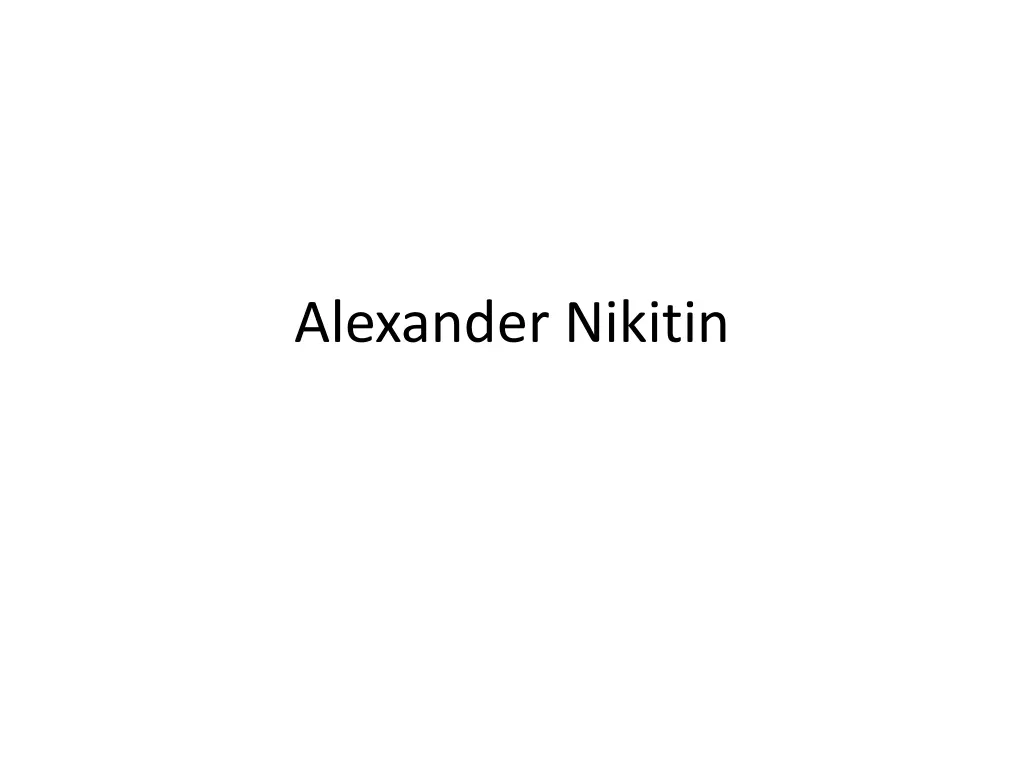
Alexander Nikitin and the Battle for Environmental Justice
Explore the compelling story of Alexander Nikitin, a former naval officer who faced imprisonment for revealing the dangers of Russia's aging nuclear submarines. Learn how he fought for environmental justice and raised awareness about potential nuclear catastrophes. Discover Nikitin's journey from a captain in the Soviet Navy to becoming an advocate for nuclear safety and the protection of our environment.
Download Presentation

Please find below an Image/Link to download the presentation.
The content on the website is provided AS IS for your information and personal use only. It may not be sold, licensed, or shared on other websites without obtaining consent from the author. If you encounter any issues during the download, it is possible that the publisher has removed the file from their server.
You are allowed to download the files provided on this website for personal or commercial use, subject to the condition that they are used lawfully. All files are the property of their respective owners.
The content on the website is provided AS IS for your information and personal use only. It may not be sold, licensed, or shared on other websites without obtaining consent from the author.
E N D
Presentation Transcript
Fancy a brush with the nasty side of what is left on the Russian state? Then make sure you do it in a relatively civilized, easily accessible part of the country, backed by energetic foreign friends. That, more or less, is the lesson form the recent fortunes of Russia s most notable political prisoners. The best-known, Alexander Nikitin, is no longer in jail. He was accused of stealing secrets about the navy s (shockingly careless) habits with nuclear waste, and passing them to foreigners. Luckily for him, he was working for an alert and able Norwegian-based environmental group, which has made him a cause c l bre. In October, a St. Petersburg court said the charges against him we inadequately prepared quite an understatement given the information he collected was from public sources. Though not formally acquitted, Mr. Nikitin is now a free man. Old Russian Habits Die Hard, The Economist, January 23-29, 1999
There are numerous sides to the Nikitin story This is on the website of The Goldman Environmental Prize: A former naval officer, Alexander Nikitin was unjustly imprisoned for almost five years for treason after revealing the potential for a nuclear catastrophe due to Russia s aging nuclear submarines based near the Norwegian border. He was acquitted in 2000. During the Cold War arms race, the former Soviet Union built and operated a large fleet of nuclear powered submarines. As a result the Kola Peninsula, adjacent to the Norwegian border along the Barents Sea, has the highest concentration of nuclear reactors in the world. Eighteen percent of the world s nuclear reactors are located there. With 69 retired submarines still containing nuclear fuel, along with 60 operating nuclear submarines, the danger of catastrophic radioactive contamination is great, especially from eroded and leaking submarines and accidents in radioactive waste storage facilities. Until 1985 Alexander Nikitin was a naval captain in the Soviet Northern Fleet, where he served as chief engineer on nuclear powered submarines. From 1987 to 1992, he worked for the Department of Defense as the senior inspector for its Nuclear and Radiation Safety Inspection Department. After he left the Navy, Nikitin felt obliged to reveal to the world the potential for nuclear catastrophe and to help Russia handle its fleet of decommissioned nuclear submarines. http://www.goldmanprize.org/recipient/alexander-nikitin/
Radio Free Interview with Nikitin: Nikitin served 23 years in the Soviet Navy. He rose to the rank of captain. But his title was meaningless to the FSB. The FSB was questioning Nikitin about his role as co-author of a report published by the Norwegian environmental organization Bellona critical of the Russian Navy's North Sea Fleet's handling of nuclear waste. The same day they brought him in for questioning, the FSB arrested and accused the retired captain of spying and espionage. But they did not charge him with a crime until September 1996. Nikitin would have to wait until December 1996 for the Russian prosecutor's office to admit that "mistakes had been made" in his case. http://www.rferl.org/content/article/1083447.html
Nikitin was not locked up immediately. Instead, FSB officers questioned him and attempted to get him to agree to use the services of their own hand-picked lawyer, a request he steadfastly refused. After being questioned for seven hours without a break, Nikitin was put in a cell. "They took my watch and my documents and gave me a mattress," he said. "The way the FSB thinks about environmental issues is exactly the way the Soviet KGB thought of human rights. They consider it an internal affair," said Nikitin. "Of course the FSB needs secrets, it gives them more work to do, it allows them to show their importance," he said. "They want everything to be secret, just like in the USSR."
Nikitin said Russia is still moving with the "inertia of a closed society." "They simply haven't woken up to the danger of the situation yet," he said. Nikitin is careful to distinguish between what he calls "real secrets," which are legitimately related to national security, and what people in the Soviet Union derisively referred to as "the secrets of street- sweepers." One of the main lessons Nikitin said that he has learned in the past year is the nature of the Russian security services. "Earlier I never imagined of the KGB or the FSB as such an anti-human system," he said. "They don't answer to anybody, this is very dangerous for society and earlier I didn't think this."
Did the Russian government violate Nikitins universal human rights? A. Yes B. No C. I m thinking
Do you believe in Universal Human Rights? A. Yes B. No C. I m thinking
